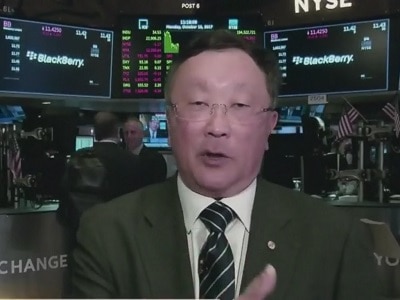
 United States President Donald Trump may be trying his best to change China’s practices when it comes to intellectual property, but whether or not more tariffs will do the job is still unclear.
United States President Donald Trump may be trying his best to change China’s practices when it comes to intellectual property, but whether or not more tariffs will do the job is still unclear.
Either way, China was already on a path to reconciling its practices with international standards, says BlackBerry CEO John Chen.
In what is shaping up to be the biggest trade confrontation in decades, the US and China have piled on threats for more tariffs on each other’s exports, ranging from soybeans and chemicals to planes, cars and industrial machinery.
At the centre of the battle is the issue of intellectual property rights, with President Trump arguing that China has for too long taken advantage of US industry by brazenly stealing IP from American companies.
“The US is acting swiftly on Intellectual Property theft. We cannot allow this to happen as it has for many years,” tweeted Trump in March.
But China’s well-known practice of hacking of intellectual property has been evolving on its own account, says Chen, who argued that as China becomes itself more technologically advanced, it will want to preserve its own IP in turn.
“About ten, 15 years ago, it was really more about, you know, Chinese just stealing the IP, blind, so to speak,” says Chen, to CNBC. “But it has evolved, the dialogue changed a little bit. It’s really now about forcing the foreign company to share the IP through some kind of a trade agreement. In other words, if you want to come into this market, you have to somehow share the IP.”
According to the US Commission on Intellectual Property Theft, China is responsible for as much as 80 per cent of IP theft against US companies, costing the US economy an estimated US$300 billion a year.
“But the amount of IP being generated by the Chinese companies is also on the rise,” says Chen, “so I think that over time, it’s going to be a non-issue because the Chinese will very much want to manage and support [their own IP]. There’s a big distance right now, still a gap, but they will.”
“There are so many tech companies being created here [in China] and some of them are giants, like the Alibabas and the Baidus of the world and the Tencents of the world, and they generate a lot of IP, and they want to protect that too,” says Chen.
BlackBerry is currently involved in its own IP battle concerning its huge cache of patents accumulated over its years in the mobile phone and software sectors. Last month, the Waterloo, Ontario-based company filed a patent infringement suit against Facebook, Instagram and WhatsApp concerning a number of features which BlackBerry says have been copied from its BlackBerry Messenger technology.
“Defendants created mobile messaging applications that co-opt BlackBerry’s innovations, using a number of the innovative security, user interface, and functionality enhancing features,” said BlackBerry in a filing with a Los Angeles federal court.
In a poke at BlackBerry’s now faded stature in the mobile phone business, Facebook Deputy General Counsel Paul Grewal replied, “Blackberry’s suit sadly reflects the current state of its messaging business,” Grewal said. “Having abandoned its efforts to innovate, Blackberry is now looking to tax the innovation of others.
Leave a Reply
You must be logged in to post a comment.






 Share
Share Tweet
Tweet Share
Share




Comment